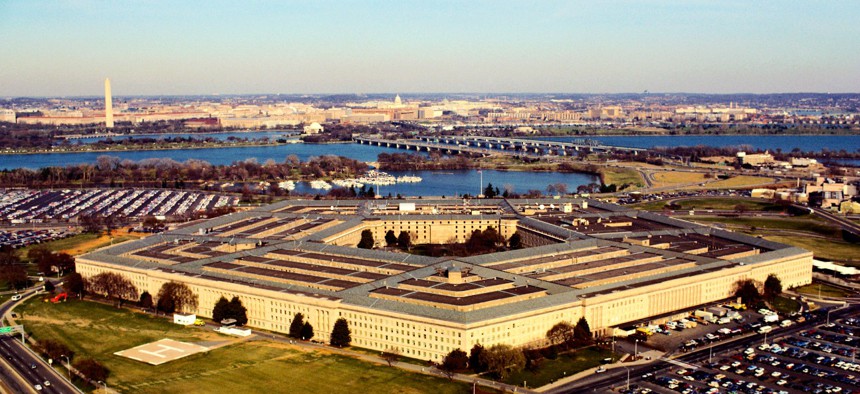
The Pentagon has had acting IGs since early 2016. Glowimages / Getty Images
It’s OK for the Acting Pentagon Watchdog to Remain in Place, A New Legal Opinion Says
The Office of Legal Counsel opinion differs from what the Government Accountability Office found over the summer.
This story was updated at 4:45 p.m. on Oct. 28 with comment from GAO.
The acting Pentagon watchdog is okay to remain in his position, a new legal opinion says, countering a previous ruling.
The Justice Department Office of Legal Counsel released a 13-page opinion issued on October 21, following the Government Accountability Office’s determination over the summer that Sean O’Donnell is serving illegally as acting Defense Department inspector general. O’Donnell, who is also the Environmental Protection Agency’s IG, was named acting Pentagon IG in April 2020 after President Trump ousted acting IG Glenn Fine.
“We conclude that the acting inspector general may continue to serve while President Biden’s first nomination is pending in the Senate; during the pendency of any second nomination submitted by President Biden; and for the 210-day periods following any rejection, withdrawal, or return of each of those two nominations,” the new opinion stated.
At the heart of the matter is the 1998 Federal Vacancies Reform Act, which sets the parameters for officials serving in temporary positions, including time considerations and changes in presidential administration. This was a hot topic under the Trump administration with all the acting officials.
“GAO concluded that, for positions for which a prior president submitted two or more unsuccessful nominations, [the act] authorizes only a revival (and 90-day extension) of a single 210-day period of acting service,” the Office of Legal Counsel opinion said. “GAO thus concluded that the current service of the acting inspector general is in violation of the Vacancies Reform Act. That reading is at odds with the text, structure and purpose of the Vacancies Reform Act.”
The Defense IG office declined to comment.
"GAO’s June 28, 2022 decision explains that the plain language of the Federal Vacancies Reform Act provides incoming presidents with additional time for vacant positions, but it does not give them a clean slate, as the new OLC opinion seems to suggest," Shirley Jones, GAO's managing associate general counsel, said in a statement. "As OLC noted, GAO did in fact rely on the plain language of the statute rather than the alternative reading. And, because the text of the relevant provisions is unambiguous, GAO reached the conclusion that it did."
Additionally, "the OLC opinion asserts that GAO’s reading of the statute 'would create significant and distinct administrative burdens on a new administration when there is no evidence that Congress intended to do that,'" Jones said. "As GAO noted in the decision, that concern cannot override the plain meaning of the act."
Anne Joseph O'Connell, professor at Stanford law who is an expert in the federal bureaucracy and vacancies act, told Government Executive she agrees with the Office of Legal Counsel opinion. When GAO issued its decision in June, she said the decision was not in line with past practice.
“Even though [the Office of Legal Counsel] provides, in my view, the best interpretation, I do think the text is ambiguous,” she said. “So I would urge Congress to clarify the issue, along with other ambiguities (the timing of first assistants, the use of the [Vacancies Reform Act] when there is an agency specific provision, firings, etc.).”
The president recently appointed O’Connell as a member of the Council of the Administrative Conference of the United States, which is an independent agency that has up to 101 members (including 40 from the public) that consider and adopt recommendations to improve federal administrative processes. She was speaking about the Office of Legal Counsel opinion in her role as a professor.
Government Executive reported in April 2021 that experts think reforms to the vacancies act are still needed, following the Trump era, to address loopholes and weaknesses.
The Pentagon has had acting IGs since early January 2016, the tail end of the Obama administration.
“It’s long past time to fix that,” Fine, former acting DoD IG and former Justice IG who is now a fellow at the Brookings Institution, wrote in Government Executive last week. “It is not good for an IG’s office, or the agency itself, to lack a permanent IG for a long time.”
President Biden nominated Robert Storch, National Security Agency/Central Security Service IG, in November 2021, to be Defense IG. He was reported favorably out of the committees and has been awaiting a vote since March, but the nomination has been subject to a hold by Sen. Josh Hawley, R-Mo.
“The delay in approving a permanent Defense watchdog illustrates the dysfunction in the nomination and confirmation process, particularly with regard to inspectors general,” Fine wrote. “IGs have been called some of the most important officials you have never heard of.”







